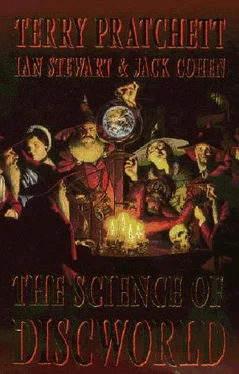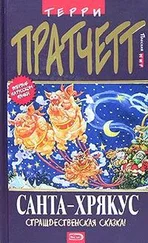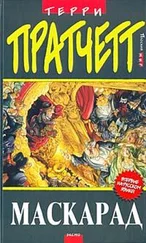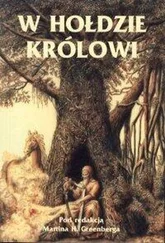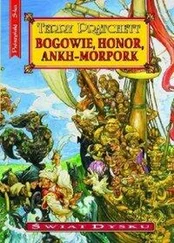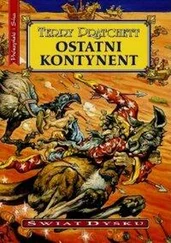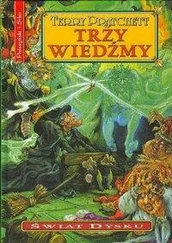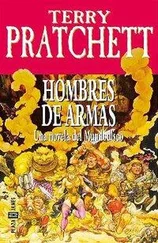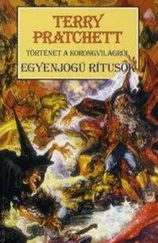Terry Pratchett - Science of Discworld
Здесь есть возможность читать онлайн «Terry Pratchett - Science of Discworld» весь текст электронной книги совершенно бесплатно (целиком полную версию без сокращений). В некоторых случаях можно слушать аудио, скачать через торрент в формате fb2 и присутствует краткое содержание. Жанр: Фантастика и фэнтези, на английском языке. Описание произведения, (предисловие) а так же отзывы посетителей доступны на портале библиотеки ЛибКат.
- Название:Science of Discworld
- Автор:
- Жанр:
- Год:неизвестен
- ISBN:нет данных
- Рейтинг книги:4 / 5. Голосов: 1
-
Избранное:Добавить в избранное
- Отзывы:
-
Ваша оценка:
- 80
- 1
- 2
- 3
- 4
- 5
Science of Discworld: краткое содержание, описание и аннотация
Предлагаем к чтению аннотацию, описание, краткое содержание или предисловие (зависит от того, что написал сам автор книги «Science of Discworld»). Если вы не нашли необходимую информацию о книге — напишите в комментариях, мы постараемся отыскать её.
Science of Discworld — читать онлайн бесплатно полную книгу (весь текст) целиком
Ниже представлен текст книги, разбитый по страницам. Система сохранения места последней прочитанной страницы, позволяет с удобством читать онлайн бесплатно книгу «Science of Discworld», без необходимости каждый раз заново искать на чём Вы остановились. Поставьте закладку, и сможете в любой момент перейти на страницу, на которой закончили чтение.
Интервал:
Закладка:
Sometimes natural disasters don't just eliminate a species or two. The fossil record contains a number of 'mass extinctions' in which a substantial proportion of all life on Earth disappeared. The best-known mass extinction is the death of the dinosaurs, 65 million years ago.
In order not to mislead you, we should point out at once that there is no scientific evidence for the existence of any dinosaur civilization, no matter what events are going on in the Roundworld Project. But... whenever a scientist says 'there is no scientific evidence for', there are three important questions you should ask -especially if it's a government scientist. These are: 'Is there any evidence against?, 'Has anyone looked?', and 'If they did, would they expect to find anything?'
The answers here are 'no,' 'no', and 'no'. Deep Time hides a lot, especially when it's assisted by continental movement, the bulldozing ice sheets, volcanic action and the occasional doomed asteroid. There are few surviving human artefacts more than ten thousand years old, and if we died out today, the only evidence of our civilization that might survive for a million years would be a few dead probes in deep space and various bits of debris on the Moon. Sixty-five million? Not a chance. So although a dinosaurian civilization is pure fantasy, or, rather, pure speculation, we can't rule it out absolutely. As for dinosaurs who were sufficiently advanced to use tools, herd other dinosaurs ... well, Deep Time would wash over them without a ripple.
Dinosaurs are always among the most popular exhibits at museums. They remind us that the world wasn't always like it is now; and they remind us that humans have been on this planet for a very short time, geologically speaking. Basically, dinosaurs are ancient lizards. The ones whose bones we all go to gawp at in museums are rather big lizards, but many were much smaller. The name means 'terrible lizard', and anyone who watched Jurassic Park will understand why.
An Italian fossil collector who watched the Spielberg movie suddenly realized that a perplexing fossil, filed away for years in his basement, might well be a bit of a dinosaur. He then sent it to a nearby university, where it was found not just to be a dinosaur, but a new species. It was a young therapod, small flesh-eating dinosaurs that are the closest relatives of birds. Interestingly, it didn't have any feathers. A story straight out of the movies: narrative imperative at work in our own world ... traceable, as always, to selective reporting. How many fossil hunters owned a bit of dinosaur bone but didn't make the connection after seeing the movie?
In the human mind, dinosaurs resonate with myths about dragons, common to many cultures and many times; and many miles of suggestions have appeared to explain how the dragon-thoughts in our minds have come down to us, over millions of years of evolution, from real dinosaur images and fears in the minds of our ancient ancestors. However, those ancestors must have been very ancient, for those of our ancestors that overlapped the dinosaurs were probably tiny shrewlike creatures that lived in holes and ate insects. After more than a hundred million years of success, the dinosaurs all died out, 65 million years ago, and the evidence is that their demise was sudden. Did proto-shrews have nightmares about dinosaurs, all that time ago? Could such nightmares have survived 65 million years of natural selection? In particular, do shrews today have nightmares about fire-breathing dragons, or is it just us? It seems likely that the dragon myth comes from other, less literal, tendencies of that dark, history-laden organ that we call the human mind.
Dinosaurs exert a timeless fascination, especially for children. Dinosaurs are genuine monsters, they actually existed, and some of them, the ones we all know about, were gigantic. They are also safely dead.
Many small children, even if they are resistant to the standard reading materials in school, can reel off a long list of dinosaur names. 'Velociraptor' was not notable among them before Jurassic Park, but it is now. Those of us who still have an affection for the brontosaur often need to be reminded that for silly reasons science has deemed that henceforth that sinuous swamp-dwelling giant must be renamed the apatosaur. So attuned are we to the dinosaurs that the drama of their sudden disappearance has captured our imaginations more than any other bit of pakeontology. Even our own origins attract less media attention.
What about the sudden demise?
For a start, quite a few scientists have disputed that it ever was sudden. The fossil record implicates the end of the Cretaceous period, 65 million years ago, as 'D-Day'. This was also the start of the so-called Tertiary period, or Age of Mammals, so the end of the dinosaurs is usually called the K/T boundary, 'K' because Germans spell Cretaceous with a K. But if we assume that the end of the Cretaceous was 'when it happened', then many species seemed to have anticipated their end by vanishing from the fossil record five to ten million years earlier. Did amorous dinosaurs, perhaps, say to each other 'It's just not worth going through with this reproduction business, dear, we're all going to be wiped out in ten million years.'? No. So why the fuzzy fade-out over millions of years? There are good statistical reasons why we might not be able to locate fossils right up to the end, even if the species concerned were still alive.
To set the remark in context: how many specimens of Tyrannosaurus rex, the most famous dinosaur of all, do you think that the world's universities and museums have between them? Not copies, but originals, dug from the rock by palaeontologists? Hundreds ... surely?
No. Until Jurassic Park, there were precisely three, and the times when those particular animals lived have a spread of five million years. Three more fossilized T. rexes have been found since, because Jurassic Park gave dinosaurs a lot of favourable publicity, making it possible to drum up enough money to go out and find some more. With that rate of success, the chance of a future race finding any fossil humanoids, over the whole period of our and our ancestors' existence, would be negligible. So if some species had survived on Earth for a five million year period, it is entirely likely that no fossils of it will have been found, especially if it lived on dry land, where fossils seldom form. This may suggest that the fossil record isn't much use, but quite the contrary applies. Every fossil that we find is proof positive that the corresponding species did actually exist; moreover, we can get a pretty accurate impression of the grand flow of Life from an incomplete sample. One lizard fossil is enough to establish the presence of lizards, even if we've found only one species out of the ten thousand that were around.
Bearing this in mind, though, we can easily see that even if the death of the dinosaurs was extremely sudden, then the fossil record might easily give a different impression. Suppose that fossils of a given species turn up randomly about every five million years. Sometimes they're like buses, and three come along at once, that is, within a million years of each other. Other times, they're also like buses: you wait all day (ten million years) and don't see any at ail. During the ten million year run-up to the K/T boundary, you find random fossils. For some species, the last one you find is from 75 million years ago; for others it's from 70 million years ago. For a few, by chance, it's from 65 million years ago. So you seem to see a gradual fade-out.
Unfortunately, you'd see much the same if there really had been a gradual fade-out. How can you tell the difference? You should look at species whose fossils are far more common. If the demise was a sudden one, those ought to show a sharper cut-off. Species that live wholly or partially in water get fossilized more often, so the best way to time the K/T mass extinction is to look at fossils of marine species. Wise scientists therefore mostly ignore the dinosaur drama and fiddle around with tiny snails and other undrarnatic species instead. When they do, they find that ichthyosaurs also died out about then, as did the last of the ammonites and many other marine groups. So something sudden and dramatic really did happen at the actual boundary, but there may well have been a succession of other events just before it too.
Читать дальшеИнтервал:
Закладка:
Похожие книги на «Science of Discworld»
Представляем Вашему вниманию похожие книги на «Science of Discworld» списком для выбора. Мы отобрали схожую по названию и смыслу литературу в надежде предоставить читателям больше вариантов отыскать новые, интересные, ещё непрочитанные произведения.
Обсуждение, отзывы о книге «Science of Discworld» и просто собственные мнения читателей. Оставьте ваши комментарии, напишите, что Вы думаете о произведении, его смысле или главных героях. Укажите что конкретно понравилось, а что нет, и почему Вы так считаете.
